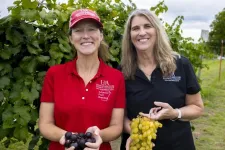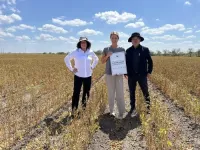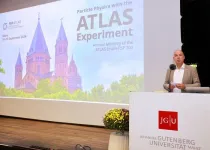(Press-News.org) Despite high use of continuous glucose monitoring and insulin pump therapy, fear of hypoglycaemia (low blood sugar) remains a significant barrier to physical activity and exercise for adults with type 1 diabetes (T1D), according to new research to be presented at this year’s Annual Meeting of The European Association for the Study of Diabetes (EASD), Madrid (9-13 Sept).
However, the findings suggest that if exercise and diabetes management are discussed in the clinic, this fear could be reduced.
“Regular exercise can help individuals with diabetes to achieve their blood glucose goals, improve their body composition and fitness, as well as reduce their risk of heart attacks and strokes which is higher in people with type 1 diabetes,” explained lead author Dr Catriona Farrell from the University of Dundee, Scotland, UK. “Yet many people living with type 1 diabetes do not maintain a healthy body weight or manage to do the recommended amount of physical activity each week.”
A number of previous studies have examined barriers to exercise in T1D, but these have been limited by their small sample size.
To fill this important evidence gap, researchers from the University of Dundee assessed knowledge and barriers to physical activity in adults with T1D and associated predictive factors.
Adults with T1D were recruited from the NHS Research Scotland Diabetes Network (research register) and internationally via social media.
Overall, 463 adults, 221 men and 242 women, with T1D answered an anonymous web-based questionnaire to assess barriers to physical activity (measured on the modified Barriers to Physical Activity in Type 1 Diabetes [BAPAD-1] scale), diabetes management, and attitudes to exercise and sport.
Participants were asked to rate on a 7-point Likert scale (1, extremely unlikely to 7, extremely likely) the chance that each of 13 factors would keep them from doing regular physical activity in the next 6 months. Factors included: loss of control over diabetes, the risk of hypoglycaemia, the fear of being tired, the fear of getting hurt, a low fitness level, and lack of social support.
Researchers calculated average scores for each factor and assessed which were most correlated with perceived barriers to physical activity, as well as identifying independent predictors.
The participant reported median age of respondents was 45-54 years, median disease duration 21-25 years, and median HbA1c 50-55 mmol/mol (an ideal level is 48 50-55 mmol/mol or below).
Over three-quarters (79%) of respondents reported using continuous or flash glucose monitoring, around two-thirds (64%) said they were treated with multiple daily insulin injections, and over a third (36%) reported used insulin pump therapy.
The researchers identified that despite advances in technologies and diabetes management, risk of hypoglycaemia with exercise remains a significant barrier to physical activity.
Importantly, participants who best understood the importance of adjusting insulin dose before and after exercise as well as adjusting carbohydrate intake for exercise were found to be less fearful of hypoglycaemia associated with physical activity. This knowledge is essential in order to adapt insulin and/or carbohydrate intake to prevent hypoglycaemia induced by exercise.
The researchers also found that being asked about exercise or sport within a diabetes clinic was negatively correlated with fear of hypoglycaemia, and identified exercise confidence as the strongest independent predictor of fear of physical activity.
“Our findings demonstrate that in order to break down the barriers to physical activity, and empower our patients to exercise safely and effectively, we need to improve the education we provide and our dialogue about exercise in clinics,” said Dr Farrell. “In turn, this should help them to achieve the multitude of health benefits that exercise offers.”
END
Fear of hypoglycaemia remains a major barrier to exercise among adults with type 1 diabetes
2024-09-12
ELSE PRESS RELEASES FROM THIS DATE:
New technology ‘game changing’ for marathon runners with type 1 diabetes
2024-09-12
A series of case reports to be presented at this year’s Annual Meeting of The European Association for the Study of Diabetes (EASD), Madrid (9-13 Sept), describe how a technology giving insulin doses informed by an insulin pump algorithm helped three adults with type 1 diabetes better manage their blood sugars enabling them to lead more active lives, and even run marathons.
The AID system contains an advanced hybrid closed loop algorithm that automates the delivery of both basal and correction bolus insulin every 5 minutes based on sensor glucose values.
“It is great to see advances in ...
Vitis vinifera and muscadines: Grape breeders seek the best of both grapes
2024-09-12
By John Lovett
Arkansas Agricultural Experiment Station
FAYETTEVILLE, Ark. — Muscadines may be the folksy American of the grape world, but they have many qualities like disease resistance and unique flavors that are desired in the more popular Vitis vinifera (bunch grapes) species.
Likewise, Vitis vinifera — the species that most people eat as table grapes and drink in wine — has many characteristics desirable for muscadines, like thinner skin, a crispier texture and seedlessness. Successfully combining traits from these two species of grapes is a challenge due to differing numbers ...
A new tack for slack: motivate workers
2024-09-12
Workplace communications platforms such as Slack and Microsoft Teams are sometimes accused of reducing productivity by distracting workers with constant messages and the need to respond to them.
But new research by Wen Wen, associate professor of information, risk, and operations management (IROM) at Texas McCombs, shows that companies can use them to do the opposite: to motivate workers.
How? By praising successful employees in all-staff channels that everyone can see — especially when they can’t see one another face-to-face.
“One important challenge faced by many companies is how to motivate remote workers and keep them productive,” ...
UTA harvests first climate-smart soybean crop
2024-09-12
UT Arlington biologists, working with underserved farmers in South Texas, have harvested their first crop of climate-smart soybeans. This harvest is part of a four-and-a-half-year, $5 million project funded by the U.S. Department of Agriculture (USDA) to test whether climate-smart agricultural practices can reduce emissions of greenhouse gases (GHGs) responsible for climate change—including carbon dioxide, methane, and nitrous oxide—while simultaneously increasing crop production.
“We ...
JGU hosts annual meeting of the ATLAS Collaborative Research Center
2024-09-12
The connections between particles and their mass, the composition of the universe out of matter and antimatter and the search for previously unknown particles such as the so-called “dark matter” are the focus of researchers at the research center CERN in Geneva, which is celebrating its 70th birthday this year with events all around the world. In four large-scale experiments, scientists at the Large Hadron Collider (LHC) are getting to the bottom of the secrets of the universe. This particle accelerator offers researchers ...
Med school scientist receives prestigious NSF award for inflammation research
2024-09-12
Associate Professor Justine Tigno-Aranjuez will use a five-year grant of more than $1 million to study how influences on the production of lipid mediators to better understand impacts on inflammation.
A College of Medicine researcher has received a prestigious U.S. National Science Foundation CAREER Award to support her research into the cellular causes of inflammation, discoveries that could be pivotal for treating conditions like Crohn’s disease and arthritis.
Justine Tigno-Aranjuez’s lab has been researching lipid mediators — ...
Uptick in drug overdose rates is widely reported especially among young women
2024-09-12
Overdose rates in Colombia involving illegal opioids, hallucinogens, stimulants and sedative psychotropic medication increased greatly during 2018-2021, mainly caused by overdoses in young women, according to a study at Columbia University Mailman School of Public Health. Drug overdoses increased by 356 percent from 8.5 to 40.5 percent per 100,000 individuals from 2010 to 2021. The findings are published in the American Journal of Public Health.
The study is the first to describe national ...
Understanding what helps families with teens maintain household vaping bans
2024-09-12
UNIVERSITY PARK, Pa. — In the roughly 20 years since e-cigarettes were introduced in the United States, use among young people has grown substantially. By 2022, more than one in five high school seniors reported they had vaped nicotine in the past month.
Household smoking bans — rules against anybody smoking inside a home — are an effective tool for delaying or preventing teen cigarette smoking, according to Jennifer Maggs, professor of human development and family studies at Penn State, and her collaborators, so they examined if the same might hold true for vaping. They assessed how many households with teenage children in the ...
Can AI talk us out of conspiracy theories?
2024-09-12
Have you ever tried to convince a conspiracy theorist that the moon landing wasn’t staged? You likely didn’t succeed, but ChatGPT might have better luck, according to research by MIT Sloan School of Management professor David Rand and American University professor of psychology Thomas Costello, who conducted the research during his postdoctoral position at MIT Sloan.
In a new paper “Durably reducing conspiracy beliefs through dialogues with AI” published in Science, the researchers show that large language models can effectively reduce ...
‘Even the deepest of rabbit holes may have an exit’
2024-09-12
Embargoed: Not for Release Until 2:00 pm U.S. Eastern Time Thursday, 12 September 2024
‘Even the deepest of rabbit holes may have an exit’
Pathbreaking psychology study reveals conversations with AI models can reduce conspiracy theory beliefs
(WASHINGTON, D.C.) Sept. 12, 2024 – ‘They’re so far down the rabbit hole of conspiracy theories that they’re lost for good’ is common thinking when it comes to conspiracy theorists. This generally accepted notion is now crumbling.
In a pathbreaking research study, a team of researchers from American University, ...


